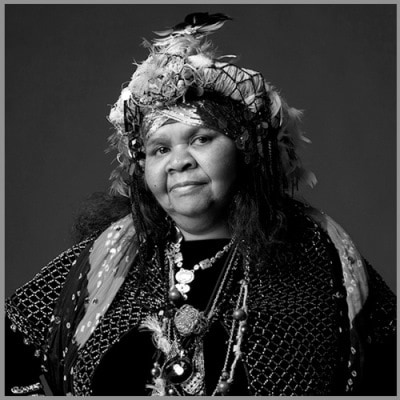
- Inducted:
- 2015
Ruby Hunter was an acclaimed songwriter and performer who used music to champion the rights of Aboriginal women and children. A nurturing soul, she rose above the tragedy of being a member of the Stolen Generation to give a voice to the vulnerable and offer strength to those who needed it.
A member of the Stolen Generations
A proud Ngarrindjeri woman, Ruby was born in 1955 near the Murray River in the Coorong region of South Australia. She was 8 years old when she and her 4 siblings were taken from their family. She remembered that the authorities simply arrived one day in a big car, promising to take the children to the circus. She was soon separated from her sisters and brothers at the Seaforth Children's Home in Adelaide, before being placed in a series of institutions and foster homes. At the age of 16 Ruby was finally released to make her own way. With no idea of where to go, she made her home on the streets of Adelaide.
While she was homeless in Adelaide Ruby met Archie Roach, also a member of the Stolen Generations, who had drifted to Adelaide from Mildura across the Victorian border. Living together on the streets of Adelaide, they formed an enduring bond that would last for the rest of Ruby's life.
It was a hard life, however, characterised by dependence on alcohol to ease the pain. Ruby nurtured Archie as he began to translate his experience of despair and homelessness into music that would eventually resonate across the nation. She also drew on her childhood experiences in caring for vulnerable children and young people, as well as in her own music.
Ruby and Archie made their own home a welcoming haven for homeless and disadvantaged young people
Moving to Victoria with Archie and their two children, Ruby worked for a time at the Margaret Tucker Hostel which provided supported accommodation for homeless Aboriginal girls and women. Together with Archie, she cared for up to 14 children at a time in a family group home run by the Victorian Aboriginal Child Care Agency in Thornbury. Later she and Archie made their own home a welcoming haven for homeless and disadvantaged young people. Ruby was also a tireless worker on behalf of the Winja Ulupna Women's Recovery Centre, a rehabilitation service for Aboriginal women in St Kilda.
Ruby began writing songs in secret, putting down on paper reflections of her experiences as a homeless young person. Her talents came to light when Archie, by then an acclaimed songwriter and performer, discovered her song Down City Streets and recorded it on his first album, Charcoal Lane, in 1990.
On the strength of Down City Streets Ruby was offered her own recording contract, becoming the first Australian Aboriginal woman to sign with a major recording label.
A successful musical career
In 1994 Ruby released her first album, Thoughts Within. Her second album, Feeling Good, earned her the Best Female Performer of the Year at the Deadly Awards in 2000. In 2003 Ruby was recognised for her outstanding contribution to Aboriginal and Torres Strait Islander music.
In 2004 Ruby and Archie collaborated with Paul Grabowsky on the production of Ruby’s Story, which won the Deadly Award for excellence in film and theatrical score. Ruby was also a driving force behind the formation of Black Arm Band, a company of leading Indigenous and non-Indigenous performers from around Australia. Black Arm Band tours and presents contemporary Indigenous performances at major festivals in capital cities and in remote Australian communities.
Despite the pressures of successful musical careers, Ruby and Archie continued to give back to the community. They toured remote Indigenous communities to present song writing workshops in schools.
Ruby's skills as a songwriter and performer were complemented by her ability to nurture and support others, particularly the young.
Ruby passed away in 2010, leaving a legacy that endures in her music, her beloved family and the countless others whose potential she recognised and encouraged.
Updated

